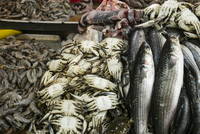Read more
Read more
Inland fisheries are particularly important in this respect where the majority of the catches from small-scale fisheries are directed to human consumption. As such, small-scale fisheries serve as an economic and social engine, providing food and nutrition security, employment and other multiplier effects to local economies while underpinning the livelihoods of riparian communities. For many small-scale fishers and fish workers, fisheries represent a way of life and the sub sector embodies a diverse and cultural richness that is of global significance.
Similarly, the contribution of small-scale aquaculture to sustainable rural development includes, for example, securing food, efficient use of water, farm materials and other resources, creating wealth, diversifying livelihoods, generating rural employment and income, utilizing family labour, fostering social harmony and empowering women. The contribution of aquaculture to the aquatic protein supply is expected to keep on growing, due to demand from an increasing world population, shifting consumption patterns and stagnating capture production.
The precise characteristics of small-scale producers vary depending on the location; indeed, small-scale fisheries tend to be strongly anchored in local communities, reflecting often historic links to adjacent fishery resources, traditions and values, and supporting social cohesion. In addition to employment as full- or part-time fishers, fish farmers and fish workers, seasonal or occasional in the sectors activities provide vital supplements to the livelihoods of millions. These activities may be a recurrent sideline activity or become especially important in times of difficulty. Many small-scale fishers, fish farmers and fish workers are self-employed and engaged in directly providing food for their household and communities as well as working in commercial fishing, processing and marketing.
Where poverty exists in small-scale fishing and aquaculture communities, it is of a multidimensional nature and is not only caused by low incomes but also due to factors that impede full enjoyment of human rights including civil, political, economic, social and cultural rights. These communities are often located in remote areas and tend to have limited or disadvantaged access to markets, and may have poor access to health, education and other social services. Other characteristics include low levels of formal education, existence of ill health (often including above-average incidences of HIV/AIDS in fishing communities) and inadequate organizational structures.
The opportunities available are limited, as small-scale fishing communities face a lack of alternative livelihoods, youth unemployment, unhealthy and unsafe working conditions, forced labour and child labour. Pollution, environmental degradation, climate change impacts and natural and human-induced disasters add to the threats facing small-scale fishing and aquaculture communities. All these factors make it difficult for small-scale producers to make their voices heard, defend their human rights and tenure rights, and secure the sustainable use of the natural resources on which they depend.


